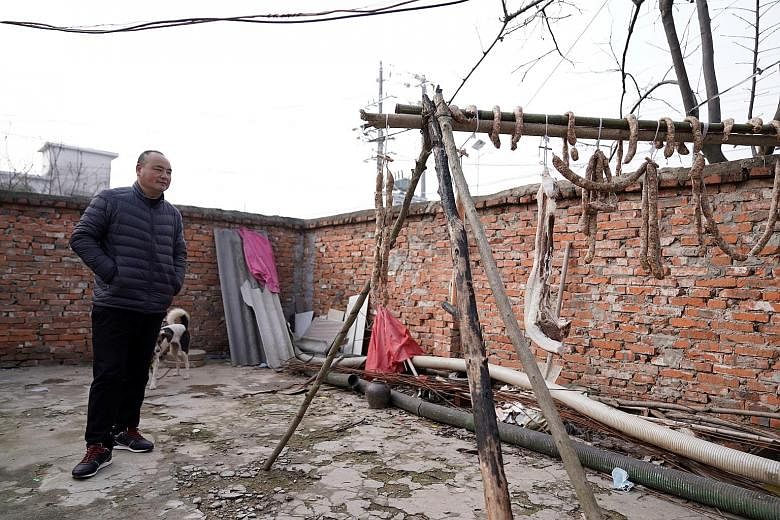GUSHI COUNTY/BEIJING • For Madam Xu, a mother and wife from a village in Gushi county, in China's Henan province, losing her family's entire pig herd to African swine fever almost meant not serving cured pork, known as la rou, and dried sausages that are central to her Chinese New Year meals.
"I wasn't going to make any this year, but then my son said 'Ma, I want to eat sausage; every year we have it'. So I said 'OK, I'll make a bit'," she said, standing in her yard strung with homemade sausages, fish and cured pork on a line.
Like millions of other Chinese families, Madam Xu will go with less of her favourite pork dishes as African swine fever has decimated the pig herds.
China is the world's top pork consumer and la rou and dried sausages are eaten all over the country. Typically made during winter ahead of the Chinese New Year, strips of pork belly and leg meat are salted or smoked before being left outside in the sun for days.
Pork production fell 21 per cent last year, official data showed yesterday. That followed the Agriculture Ministry reporting that the national pig herd shrank more than 40 per cent by October.
Pork prices have tripled from a year ago because of the shortage, and the resulting higher food costs have caused inflation to spike to an eight-year high.
"Every year I make a lot, but this year I just did a little," said Madam Xu, who added that even that small amount cost her 300 yuan (S$59). "Pork just costs too much. People can't bear the price."
China's government has released more than 200,000 tonnes of frozen pork since last month to boost supplies ahead of the country's most important national holiday that begins later this month. It also imported a record 375,000 tonnes of pork last month.
Traditionally, la rou and sausages are made at home, but as urban migration rises, artisanal markets selling home-style meats have popped up in most cities.
But this festive season, la rou sellers are reporting slowing sales and fewer customers.
"This year, pork is very expensive so individual customers are buying less (la rou)," said seller Zhang Sheng, who has sold la rou at a wet market in Guiyang, in Guizhou province, for the past five years.
In Shanghai, four la rou makers said their businesses have taken a hit because of price increases of 20 to 30 per cent. "I imagine many people will be having more chicken and duck this new year," said one of the sellers.
A taxi driver from Henan who works in Beijing said his family would normally make as much as about 40kg of cured pork, but they only made about 15kg this year.
"They made more cured chicken and fish instead," said the driver, who gave his name as Mr Chen.
REUTERS

